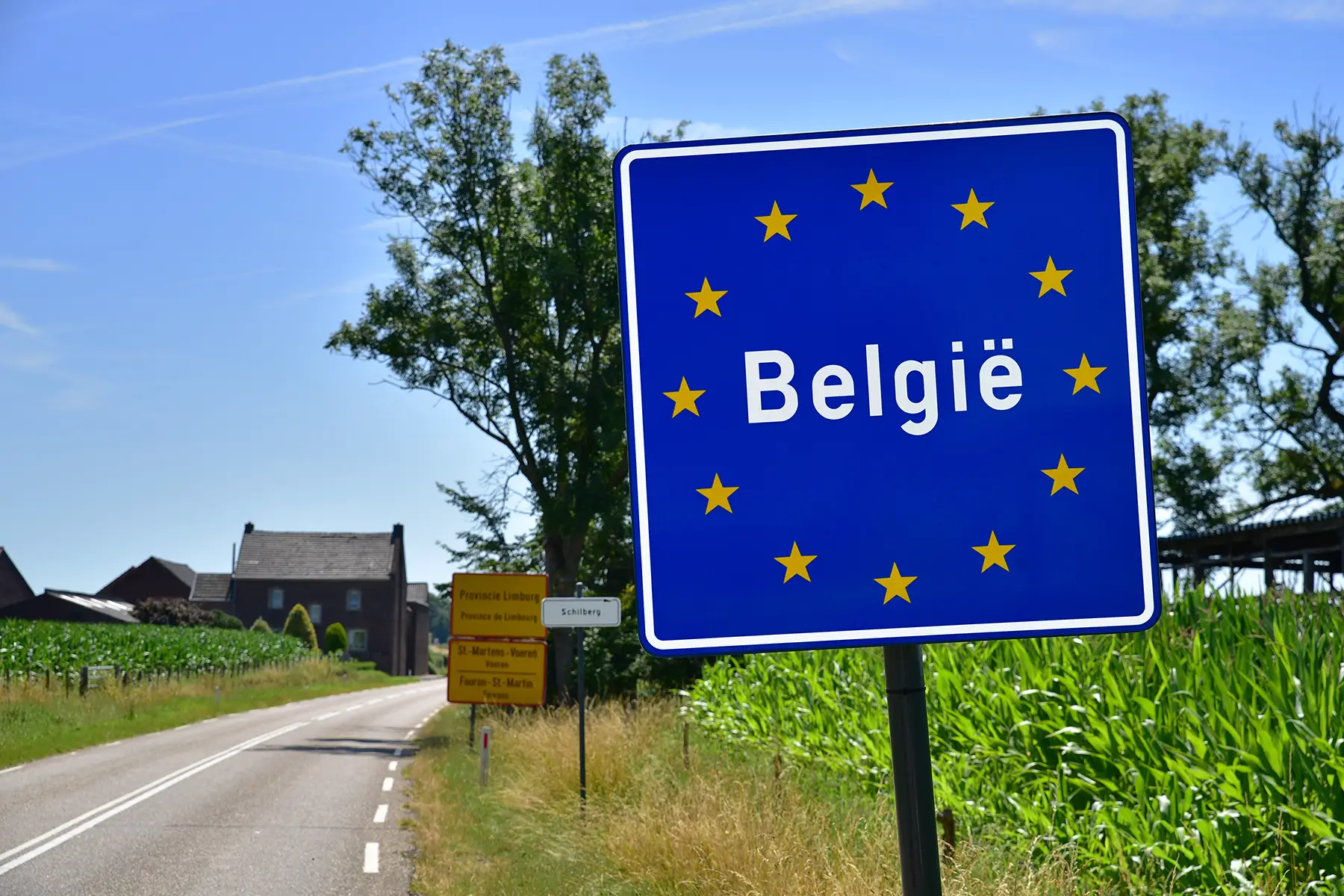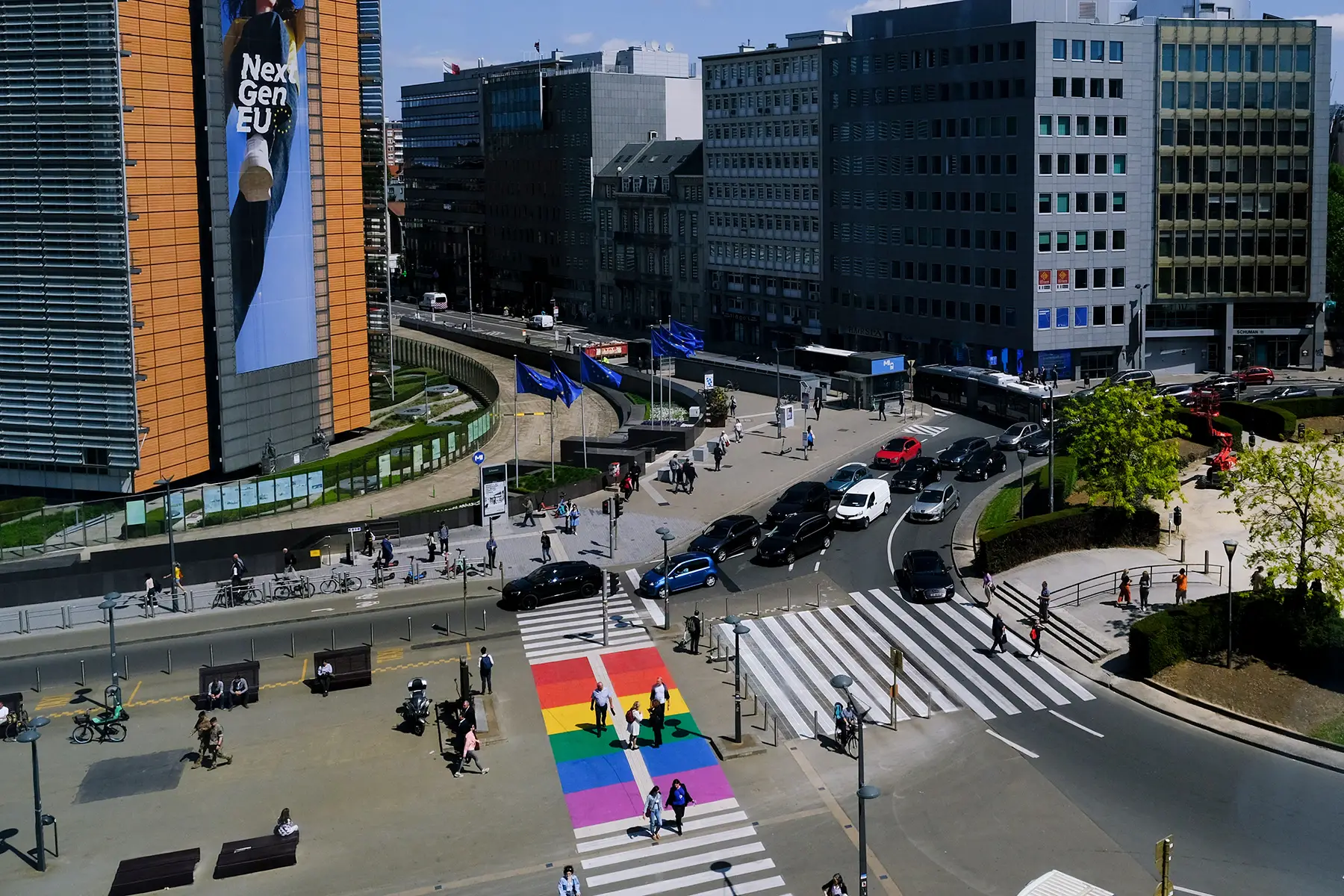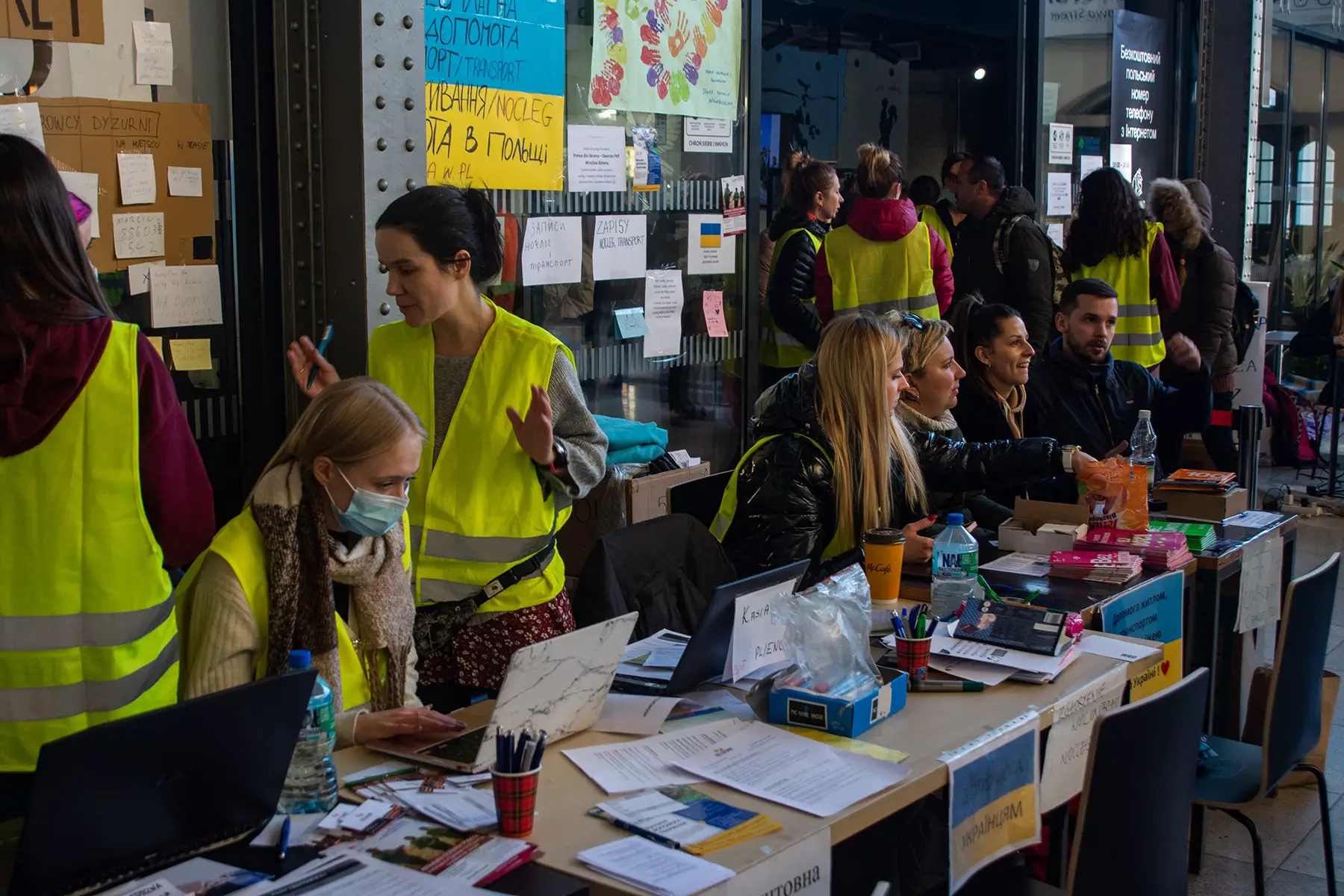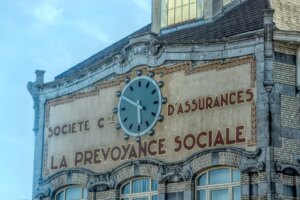You don’t have to be a hardened criminal to come in contact with the police. For example, your bag could be snatched while at the train station, or you could be taken to court after driving through one too many red lights.
When that happens, having some knowledge of the justice system could help you prepare for what comes next. Here’s what you need to know about crime in Belgium, including the following:
Ground News
Get every side of the story with Ground News, the biggest source for breaking news around the world. This news aggregator lets you compare reporting on the same stories. Use data-driven media bias ratings to uncover political leanings and get the full picture. Stay informed on stories that matter with Ground News.
Overview of the legal system in Belgium
Similarly to most other democratic countries, the Belgian government is separated into three branches. These are called the legislative, executive, and judicial powers (i.e., trias politica).

The judicial power (i.e., the legal system) consists of a mix of public and private laws:
- Private law deals with disputes between people or entities (such as companies) regarding things like contracts, property, family matters, and personal injury. The aim of these civil cases is typically to resolve the dispute and get compensation. Private law is outlined in the Belgian Civil Code (Dutch: Burgerlijk Wetboek, French: Code Civil).
- Public law deals with offenses against the state or society as a whole (e.g., murder, theft, fraud, and other criminal activities). The purpose of criminal cases is to punish individuals who have violated the law and protect society from unlawful behavior. Public law is outlined in the Penal Code (Dutch: Strafwetboek, French: Code Pénal). In February 2024, the Belgian government adopted a new Penal Code; this law will likely enter into force in 2026.
Both the federal and localized governments (i.e., regions and communities) are responsible for creating and upholding Belgium’s laws and decrees. Other sources of law include the Belgian Constitution and international law (e.g., regulations from the European Union (EU) and United Nations (UN)).
How fair is the Belgian legal system?
In 2023, Belgium ranked 16th out of 140 countries on the World Justice Project’s Rule of Law Index. That means the country has strong regulatory enforcement, order and security, and civil and criminal justice.
The Global Access to Justice Project, however, concludes that the “legal system is fairly well developed, but it does not always function optimally. […] The emphasis is mainly on dispute settlement; less attention is paid to prevention.”
According to the 2024 Justicebarometer survey, around 54% of the Belgian population trusts their legal system. This is slightly higher than the EU average of 52% (2022). Interestingly, the Belgian police force gets a much better grade. Roughly 81% of respondents say they trust the police.
Crime and crime rates in Belgium
Whether the population trusts its judicial system or not, Belgium scores relatively well among the safest countries in the world. It’s ranked 20th out of 163 on the 2023 Global Peace Index (GPI). Crime rates are lower than in similar countries, like Norway, Sweden, the United Kingdom (UK), Greece, and France.

Most crimes were reported in the arrondissements of Brussels Capital (Dutch: Brussel Hoofdstad, French: Bruxelles Capitale), Antwerp (Dutch: Antwerpen, French: Anvers), and East Flanders (Dutch: Oost-Vlaanderen, French: Flandre orientale).
The most common types of crime in Belgium are (2023):
- Theft and extortion
- Bodily harm (including assault and murder)
- Fraud
- Vandalism
- Cybercrime
According to the Global Organized Crime Index, the country also suffers from certain endemic issues, including drug trafficking, extortion, and the occasional terrorist threat. In 2023, the terrorism threat level was raised temporarily to level 4 for Brussels and level 3 for the rest of Belgium following a shooting near Boulevard d’Ypres and Place Sainctelette.
Tips for preventing crime
You are not at fault if you fall victim to a crime. Even so, there are some things within your control that could ensure your safety and that of your belongings.
In general, it’s important to pay attention and be aware of your surroundings. Large squares, heavily touristed areas, and train stations are often crowded and vulnerable to theft-related crimes. It’s also good to avoid certain neighborhoods or deserted areas at night if you’re alone.

If possible, you should carry your most valuable possessions (e.g., passports, residence cards, bank cards, and cell phones) in different places on your body and out of sight. Bag snatching and pickpocketing are somewhat common in larger cities; you should be extra mindful in these areas.
When taking money from an ATM, stay focused and certainly never accept ‘help’ from strangers. You should also avoid making money transactions in public or using public Wi-Fi.
You can protect yourself against online card scams by setting up strong passwords and two-factor authentication. The government’s Safeonweb portal and the European Consumer Centre Belgium provide more cybersecurity tips to increase your safety online.
When it comes to vehicles, make sure you don’t leave any valuables in your vehicle and keep your car doors and windows closed at gas stations. The same applies to your home: remember to lock the doors and close the windows when leaving the house. The Belgian authorities also recommend installing an alarm system and registering your possessions to help trace them if stolen.
If a crime does occur, you might face avoidable costs. It’s therefore recommended that you take out insurance (e.g., car insurance, home insurance).
How to report a crime
If you are a victim of a crime
In case of an emergency, you must call the national number 101 or 112 first. The operator will direct you to the local police in Belgium.

Non-urgent crimes can be reported in person at your nearest police station (Dutch: politiekantoor, French: poste de police). You may need to make an appointment first.
If you are a Belgian citizen and the crime didn’t include any violence or threats, you can also report a complaint online. Keep in mind that this is only possible in one of the country’s three official languages: Dutch, French, or German.
To make a complaint, you are required to identify yourself with a valid passport or ID card. If your identification documents are lost or stolen, you must first contact your home embassy or consulate.
Make sure to provide as much information as possible to assist with the investigation. This includes the crime itself, the time and location, the physical description of the perpetrator(s), and any possible witnesses.
If you are the witness of a crime
Witnesses are legally obligated to report (potential) crimes against:
- People (e.g., an assault on the street)
- Property (e.g., theft or vandalism)
- Public security (e.g., a terrorist attack)
You can come forward at a police station or by contacting their local public prosecutor’s office (Dutch: openbaar ministerie or parket, French: parquet). As a witness, you may be called to give your statement in court if the crime is prosecuted.
Overview of the Belgian police
Depending on the nature of the crime, the investigation is led by either the local or federal police in Belgium. These are not hierarchical; they are two equal branches of the Belgian law enforcement services that complement each other but operate autonomously.
The local police (Dutch: lokale politie, French: police locale) provide basic policing at a district level (Dutch: politiezone, French: zones de police). There are currently 181 local police districts in Belgium (2024).

The federal police (Dutch: Federale Politie, French: Police Fédérale) carries out operations at the national and regional levels. It is responsible for larger investigations, highway security, and assisting the local police with criminal investigations where needed.
Belgium’s criminal justice system
The Code of Criminal Procedures (Dutch: Wetboek van Strafvordering, French: Code d’Instruction Criminelle) lists the regulations for crime detection, investigation, prosecution, the rights and obligations of the parties, court rulings, and the implementation of punishments.
Once you have reported a crime, the Belgian criminal justice system will be set in motion. Simply put, this is made up of three different stages:
- After a crime has occurred, police will forward your report to the public prosecutor. They decide whether to continue with a prosecution, initiate mediation, or discontinue your criminal complaint. If the case is prosecuted, the police will investigate the crime and collect evidence to identify the perpetrator.
- Next, the case is taken to court. A judge will assess whether the accused is guilty or innocent. If the case involves serious crimes such as murder or serious assault, the verdict is decided by a panel of three judges and a 12-member people’s jury
- Finally, if found guilty, the criminal is sentenced and taken to the corrections system, where the sentence will be enforced. After that, they can file an appeal.
Throughout the process, there are strict measures in place to ensure that the constitutional rights of the accused are protected. Defendants are presumed innocent until proven otherwise, and participating in a trial is a right and not an obligation. If the accused decides not to show up at the trial, there are no legal consequences.
The Belgian court and corrections systems fall under the responsibility of the Federal Public Service (FPS) Justice (Dutch: Federale Overheidsdienst (FOD) Justitie, French: Service Public Fédéral (SPF) Justice). Belgium is also part of international organizations (e.g., Interpol and Europol) to fight against organized crime and terrorism. These are also overseen by the FPS Justice.

How does Belgium’s court system work?
Belgium’s court system is hierarchical and divided into three tiers. The mildest offenses will first be heard by one of the following:
- Justice of the Peace (Dutch: vredegerecht, French: justice de paix) serves as a small claims court. It deals with civil matters that have a ‘private character’ (e.g., disputes between neighbors or tenants and landlords).
- Police court (Dutch: politierechtbank, French: tribunal de police) is the lowest criminal court in Belgium and deals with minor offenses (Dutch: overtreding, French: infraction) and traffic law violations
The outcome of these cases can be appealed to one of the lower courts. These courts also deal with other disputes (e.g., commercial disputes) and criminal misdemeanors (Dutch: wanbedrijf, French: délit).
Lower courts in Belgium
There are several forms of lower court in Belgium, including:
- Court of First Instance (Dutch: Rechtbank van eerste aanleg, French: Tribunal de première instance) is the main trial tribunal. It comprises the following chambers:
- Civil court (Dutch: burgerlijke rechtbank, French: tribunal civil)
- Correctional court (Dutch: correctionele rechtbank, French: tribunal correctionne)
- Family court (Dutch: familierechtbank, French: tribunal de la famille)
- Youth court (Dutch: jeugdrechtbank, French: tribunal de la jeunesse)
- Criminal enforcement court (Dutch: strafuitvoeringsrechtbank, French: tribunal de l’application des peines)
- Business Court (Dutch: ondernemingsrechtbank, French: tribunal de l’entreprise) is a specialized court that handles disputes between companies
- Labor Court (Dutch: arbeidsrechtbank, French: tribunal de travail) is a specialized court that handles social security and labor disputes

Higher courts in Belgium
If either party doesn’t agree with the judgment or ruling, they can file an appeal with a higher court:
- Court of Appeal (Dutch: Hof van Beroep, French: Cour d’Appel) hears cases from the Courts of First Instance and the Business Courts
- Labor Court (Dutch: Arbeidshof, French: Cour du travail) hears appeals from labor court cases
Another higher court in Belgium is the Court of Assizes (Dutch: Hof van assisen, French: Cour d’assises). This is a temporary court assembled for each new trial, which hears the most severe crimes (e.g., (attempted) manslaughter, (attempted) murder, or rape).
Judgments made by higher courts can be appealed to the Court of Cassation (Dutch: Hof van Cassatie, French: Cour de Cassation). This is the supreme court of Belgium and the final boss, so to speak. The Court of Cassation examines the legal basis for convictions and delivers the final ruling.
Administrative courts in Belgium
Belgium also has two administrative courts that monitor the government:
- Council of State (Dutch: Raad van State, French: Conseil d’Etat) considers cases from members of the public who believe the government has not followed the law
- Constitutional Court (Dutch: Grondwettelijk Hof, French: Cour Constitutionnelle) ensures that acts, decrees, and ordinances are in conformity with the Belgian Constitution. It also oversees the proper separation of powers between the public authorities.
Trial processes: how do trials work in Belgium?
Investigative phase
After a crime report has come in, the public prosecutor can order a criminal investigation (Dutch: opsporingsonderzoek, French: enquête criminelle) to gather evidence. After this is complete, the prosecutor can decide to drop the charges, propose a settlement, or indict the suspect.

In more complex cases, an investigating judge (Dutch: onderzoeksrechter, French: juge d’instruction) can call for a more in-depth judicial investigation (Dutch: gerechtelijk onderzoek, French: enquête judiciaire).
During this investigation, the suspect may be held in pre-trial detention (Dutch: voorlopige hechtenis, French: détention provisoire). A judge can also rule that the suspect may await the trial outside of jail (Dutch: voorlopige invrijheidstelling, French: ibération provisoire). In that case, they may need to post bail (Dutch: borgsom, French: caution).
Trial phase
At trial (Dutch: strafproces, French: procès criminel), the presiding judge interrogates the defendant and hears any witnesses and experts. Next, the victim can submit a claim for damages, and the public prosecutor’s office can propose a sentence or fine. After that, the defense can make their plea and present evidence.
Finally, the judge can pronounce the judgment or keep the matter under consideration. In the case of the latter, the decision follows at a later date (up to six weeks after the first court date). For serious crimes heard at the Court of Assizes, a panel of three judges and a 12-member people’s jury decides the guilt or innocence of the alleged perpetrator.
If the defendant is convicted, they can file an appeal within 30 days to the Court of Appeals or the Court of Cassation.
Punishments and sentences in Belgium
Depending on the crime, Belgium’s Penal Code can impose a fine, incarceration, or an alternative sentence. The country does not have the death penalty (Dutch: doodstraf, French: peine de mort).

Convicts can get the following punishments:
- Life imprisonment (Dutch: levenslange opsluiting, French: réclusion à perpétuité) – up to 30–40 years, depending on the municipality
- Incarceration (Dutch: gevangenisstraf, French: emprisonnement)
- Detention with electronic monitoring (Dutch: straf onder elektronisch toezicht, French: peine de surveillance électronique)
- Community service (Dutch: werkstraf, French: peine de travail)
- Autonomous probation (Dutch: autonome probatiestraf, French: peine de probation autonome)
- Removal of certain political and civil rights (Dutch: ontzetting van bepaalde politieke en burgerlijke rechten, French: interdiction de certains droits politiques et civils)
- Monetary fine (Dutch: geldboete, French: amende)
- Special forfeiture (Dutch: bijzondere verbeurdverklaring, French: confiscation spéciale)
In February 2024, Belgium adopted a new Penal Code, which will likely enter into force in 2026. Currently, the main categories of criminal offenses are infractions, misdemeanors, and crimes. Under the new rules, crimes are categorized under eight levels with different degrees of punishment, depending on their severity.
Does Belgium have a statute of limitations?
Belgium does indeed have a statute of limitations, which means there are time limits in which the prosecution must take place. This is:
- Six months for minor offenses
- Five years for misdemeanors
- 10 years for crimes
- 20 years for crimes that can result in a prison sentence of over 20 years
In February 2024, the government approved a bill that would amend the time limits to one year up to 30 years.
What are the main crimes and punishments?
Driving/traffic offenses
Traffic violations often result in a fine (e.g., illegal driving or wrong parking will cost you €58 or more). If you were caught driving under the influence, or you were in an accident that resulted in material or physical damages, you may be given a fine, lose your driving license, and face prison time.

Theft/burglary
Theft and burglary are seen as misdemeanors and are tried in lower court. Correctional punishments may include:
- Fine (starting from €26)
- Prison sentence (eight days up to five years)
- Community service (45–300 hours)
- Removal of certain political or civil rights
Fraud
People who commit fraud (Dutch: oplichting, French: fraude) can get a fine of €26–3000 and a prison sentence of between one month and five years. Tax fraud may result in a fine of €26–50,000 and a prison sentence of between eight days and five years.
Alcohol-related offenses
The legal drinking age in Belgium is 16 years old. If a minor is caught with or buying alcohol or tobacco, the provider or seller receives a €750 fine.
Belgians must “curb drunkenness.” That means you cannot be drunk in a public space or force an intoxicated person to drink more alcohol, for example. Public drunkenness can result in a €110 fine.
Driving (and cycling!) under the influence is also illegal. People who are caught drunk face hefty punishments:
| Driver | BAC level | Fine | Driving ban | Additional notes |
| Professional | 0.2–0.5 | €105 | Two hours | – |
| Novice | 0.5 or higher | €179 | Eight days to five years | Police Court may give you a €200–4,000 fine and order an alcohol lock on your car. You will have to take a new driving test to get your driver’s license back. |
| Regular or professional | 0.5–0.8 | €179 | Three hours | Police Court may give you a €200–4,000 fine and a longer driving ban. The judge may also order an alcohol lock on your vehicle. |
| Regular or professional | 0.8 or higher | €420–578 | Six hours | Police Court may give you a €1,600–16,000 fine and a driving ban of eight days to five years. The judge may also order an alcohol lock on your car. |
Repeat offenders face harsher consequences:
- If you were caught a second time within three years, the fine will increase to €3,200–40,000. You also get a driving ban of up to three months. After that, you must take a medical and psychological test, as well as a theoretical and practical driving test.
- Those caught a third time within three years face double the fine and a driving ban (€6,400–80,000 and banned for at least six months)
It’s worth noting that cyclists also risk their driver’s license when drunk cycling in Belgium.

Drug-related offenses
Drugs are illegal in Belgium. The punishments for drug-related crimes depend on the severity. For example, if you are first caught in possession of cannabis, you can face a €15–200 fine. However, those caught with hard drugs (e.g., cocaine or XTC) may receive a €8,000–80,000 fine and a prison sentence of three months up to five years.
Immigration-related crimes
Non-EU/EFTA expats living in Belgium must have a valid residence permit (Dutch: verblijfsdocument, French: titre de séjour) and keep this their person at all times. You must be able to provide it when a law enforcement official asks you to. If you cannot or refuse to show it, you may be fined up to €200.
Illegal residents without a valid immigration document face a fine and imprisonment of up to three months. They may also be given an order to voluntarily leave Belgium. If needed, the authorities will assist with forced and guided repatriation; this will result in extra administrative fees. You may also face an entry ban for up to five years.
Providing assistance to people without legal residence is not a criminal offense. Volunteers, professional care providers, or civil servants may provide legal help, medical assistance, food, clothing, or shelter.
Abusing the vulnerable position of illegal immigrants is a criminal offense. For example, landlords and employers exploiting persons without valid immigration documents can be prosecuted. Likewise, human smuggling and trafficking is a criminal offense.

Crimes of anti-social behavior/stalking
Causing a public disturbance (Dutch: verstoren van de openbare orde, French: trouble à l’ordre public) and vandalism are minor crimes in Belgium. These offenses result in a €110 fine or a prison sentence of up to seven days. Threats (Dutch: bedreigingen, French: menaces) will get you a fine of up to €4,000, plus a prison sentence of three months up to five years.
Stalking is considered a serious crime and is heard in Correctional Court. The penalty may be a €50–300 fine and/or 15 days to two years’ incarceration.
Hate crimes
The Belgian constitution grants equal rights to anyone within the country’s borders. Naturally, then, hate crimes (Dutch: haatmisdrijf, French: crime haineux) are punishable by law. Indeed, Belgium takes these crimes so seriously that perpetrators must prove their innocence (i.e., they are guilty until proven otherwise).
Numerous laws address hate crimes, including:
- Anti-Racism Law (Dutch: antiracismewet, French: loi antiraciste) – punishing those who instigate discrimination, hatred, segregation, or violence against a person or a group of people based on race, color, nationality, or ethnic descent
- Anti-Discrimination Act 2007 (Dutch: antidiscriminatiewet, French: loi anti-discrimination) – punishing crimes based on gender, gender identity, and (perceived) sexual orientation
- Culture Pact Act (Dutch: cultuurpactwet, French: loi sur le pacte culturel) – criminalizing discrimination based on ideological, philosophical, or political beliefs
In June 2023, the federal parliament passed a bill to strengthen the anti-discrimination act even more. The new legislation also recognizes discrimination by association (e.g., parents are discriminated against because of their child’s disability) and based on an alleged criterion (e.g., heteros who are perceived as LGBTQ+ after attending an event).

Hate crimes usually result in a fine and a prison sentence, the amount and duration of which depend on the severity of the offense. You can report all forms of discrimination to Unia. They will inform you of your rights and can help you look for a solution.
Violent crimes
The most serious crimes in Belgium are violence-based, such as manslaughter, murder, and sex crimes (including indecent assault of a child and rape). These are tried in the Court of Assizes and punished with life imprisonment or long-term prison sentences.
The new Penal Code will prosecute domestic violence resulting in homicide at the same level as murder (instead of manslaughter).
Acts of terrorism
Acts of terrorism (Dutch: terroristisch misdrijf, French: crime terroriste) are considered a severe crime in Belgium, punishable by life in prison.

The proposed revisions to the new Penal Code also take a stronger stance against terrorism-related offenses. For example, the law will include incitement to suicide in the context of terrorism as a serious criminal offense.
Preparation to commit terrorist attacks, including recruitment and training, will also be treated more severely in the new penal code. Moreover, the glorification of terrorism online will be seen as a major offense and could lead to up to 15 years in prison.
Belgium’s prison system: facts and figures
Belgium’s penitentiary system can be separated into youth detention centers and adult prisons, both of which fall under the responsibility of the FPS Justice.
Convicted minors and young adults between the ages of 14 and 18 can be detained in one of three community institutions (Dutch: gemeenschapsinstelling, French: établissement communautaire). In 2021, around 1,560 young offenders were sent to a juvenile delinquency center.
Convicted adults over the age of 18 are taken to one of 38 adult prisons. As of March 2024, Belgium’s total prison population was 12,316 (i.e., 104 prisoners per 10,000 inhabitants). Around 41.5% had a foreign background.
There are both open and closed institutions. Closed prisons have tight surveillance and limited freedom of movement, whereas open prisons offer more freedom and allow inmates to work inside or outside the jail. There are also detention houses and halfway houses that provide intensive support to help soon-to-be-former prisoners reintegrate back into society.
Your rights if you are arrested in Belgium
After an arrest, you can be detained for up to 48 hours. You have the right to speak with an attorney (Dutch: advocaat, French: avocat). In the case of minors, a lawyer must be present.

If your attorney is detained or you cannot afford one, you can ask to see the on-call attorney. Depending on your income, their legal assistance is free, low-cost, or regular priced (they must inform you of the cost beforehand). You can also contact NGOs like Fair Trials International for support.
You also have the right to:
- Remain silent
- Know why you are arrested or being interrogated
- A free interpreter if you don’t understand Dutch or French
- Inform someone (e.g., a family member) of your arrest. If you are a foreign citizen, you may inform your country’s embassy or consulate.
- Medical help
During any interrogation (in Dutch), you have the right to a 15-minute break. You may also present evidence and ask that there be a written record of your statement.
After 48 hours, you must be released or brought before a judge. Depending on the severity of the crime, it can take one to three months before the case is brought to court. In the meantime, the judge can detain you in prison or release you on bail.

Legal rights for foreigners
Internationals have the same legal rights as Belgian citizens.
If you were arrested on a European Arrest Warrant, you have the right to a lawyer. This can be either your own or a court-appointed lawyer. Your council and embassy must be informed immediately. A judge will hear your case within 48 hours of your arrest.
After meeting with the judge, there will be a hearing before the Court of Appeal to decide whether to extradite you or not. This happens within 20 days of your arrest. You can appeal the decision before the Court of Cassation.
If you are a refugee or asylum seeker, you have the right to stay in Belgium while your claim is being processed. During this time, you have access to shelter, food, and clothing. You have the right to legal and medical assistance and can look for work once your asylum claim has been approved.
Extradition treaties
Belgium has numerous extradition treaties with other countries in the world. That means your country of origin can ask the Belgian authorities to detain you and send you back. You can also request to serve your time in your native country, depending on your sentence.
In general, extradition requires the condition of double criminality. This means that the crime in the other country must also be considered a crime with legal consequences in Belgium.
Useful resources
- FPS Justice (Dutch: FOD Justitie, French: SPF Justice) – official website of the government agency responsible for the law and judiciary
- Federal Police (Dutch: Federale politie, French: Police Fédérale) – official website of the federal police in Belgium
- Public Prosecutor’s Office (Dutch: Openbaar Ministerie, French: Ministère Public) – official website of the Public Prosecutor’s Office in Belgium
- Fair Trial International – website of the international non-profit that provides information and assistance to people facing trials
- European e-justice portal – official EU portal with information on justice systems and trial rights in the member countries









